Fantasy Books
The Antidote
Fans of Barbara Kingsolver’s Demon Copperhead will want to grab this gorgeous magical-realist novel set on the Nebraska prairie during the height of the Dust Bowl climate disaster. Russell, a MacArthur grant winner, is best known for her collections of short stories, and this is only her second novel after the 2012 Pulitzer finalist Swamplandia! It is well worth the wait, offering a ferociously moving meditation on America’s refusal to come to terms with the violence and injustice of its own past. The story begins on “Black Sunday,” April 14, 1935, when tornadic dust storms destroyed farmland throughout the Great Plains, and a variety of point-of-view characters lead the reader to an intimate understanding of the Great Midwestern Drought that decimated the farmlands of the American prairie and worsened the Great Depression.
The premise sounds grim, but Russell draws on some of our most enchanting national myths to bring these characters to life. The alert reader will quickly realize that yes, this novel is set in the fictional town of Uz, Nebraska, in the depths of the Dust Bowl Depression, and yes, the inhabitants are menaced by dust tornados, and yes, the main characters are a scrappy orphan girl, a mysterious scarecrow, a stiff midwestern bachelor searching for love, and an exhausted prairie witch whose task it is to collect the toxic memories of her neighbors and store them away inside herself. But Russell’s evocations of L. Frank Baum’s American fairytale are subtle and never distract from the gritty, tender, fierce realism of this expansive story. The supernatural elements of the novel are infused with such a deep, compassionate humanity that the reader never has the sense that this is anything but a completely true story. Russell has created a masterpiece that will probably be on many 2025 award lists.
The post The Antidote appeared first on Historical Novel Society.
The Ballad of Mary Kearney
Ireland, 1765. When young Mary Kearney is sent to work at Goward Hall, she joins her brother and sister in service and lightens the load of her impoverished father, who has too many mouths to feed. She begins to wait on the very married Lady Mitchelstown, who is involved in a scandalous romance with Lord and Lady Goward’s son James. James eventually arranges for Mary to learn to read and write, and as they become much closer, the outrage of both the upper and lower classes descends upon them. They enter into a secret marriage, but in the eyes of the world, Mary is a mistress, and only a few at the time know that she is James’ wife. And nearby, an evil man waits, determined to ruin Mary for good.
Late 18th to early 19th-century Ireland comes alive in this book, as the characters speak to us from the past in dialect true to the time. There is a great deal of epistolary work, and it is woven in beautifully. Letters, articles, documents, and diary entries highlight the many voices, bringing each character to life with great effect. The novel begins with the dictated words of Mary’s father, who cannot read or write. The letters contain everything from love to gossip to threats, depending upon the writer. The class differences of the time are highlighted well, and the Catholic versus Protestant conflict is explored. The attempted uprising by the United Irishmen is well researched, and its consequences spill across the page. The captivating love story of James and Mary endures many hardships, including plotting and scheming from wicked people. Honest and intriguing, this gripping saga will transport and inspire you, and it just might break your heart. Highly recommended.
The post The Ballad of Mary Kearney appeared first on Historical Novel Society.
GRAVE EMPIRE by Richard Swan
Spies, Cowboys, Anarchists, O My: Polostan by Neal Stephenson
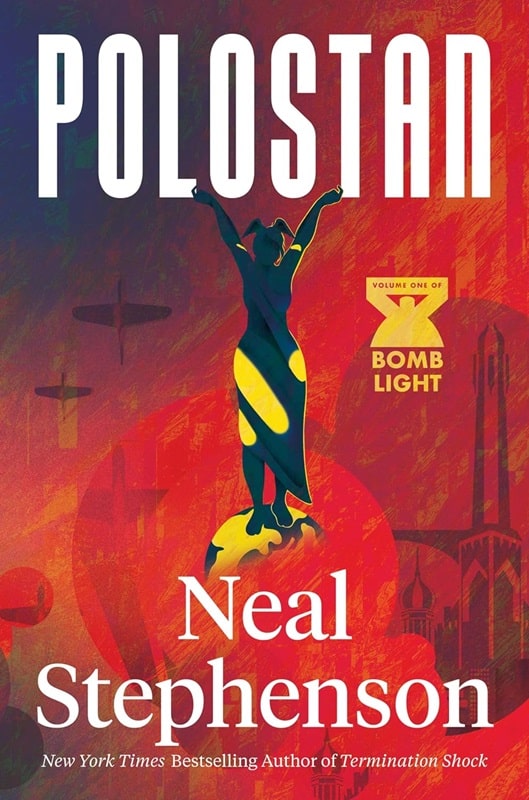
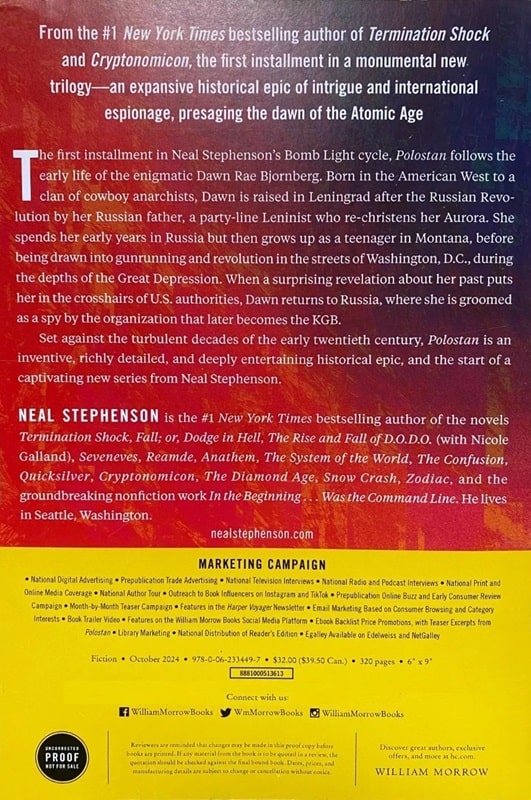
Polostan (William Morrow, October 15, 2024). Cover art uncredited
If, like me, you are a Neal Stephenson fan, you know he has a tendency to get deep into the descriptive weeds. I sometimes imagine his editor suggesting, “Neal, do we really need all this detail?” And then Neal grouchily responds, “If I didn’t think the story needed it, I wouldn’t have written it.”
Case in point from his latest novel, Polostan, a depiction of the 1933 Chicago World’s Fair Century of Progress exhibition where the protagonist, Dawn Rae Bjornberg, also known as Aurora Maximovna Artemyeva, works shilling for a shoe salesman:
She went to the fair early and stayed late, for the work was easy and there were plenty of diversions — that being the point of a fair. Her perambulations soon made her as conversant with the place as if it were an old city…As they were meant to, [the exhibits] drew visitors: 600 Norge salesmen on the B&O from Philly; 176 newsboys on the New York Central from Buffalo; 60 Episcopal bishops; 180 Civilian Conservation Corps workers en route to turpentine camps in the southeast; 100 Minnesota National Guard troops. Paramount Studios executives from Hollywood, Lions from St. Louis, Shriners from Fort Smith…
It goes on like this for quite a while. Do we really need to know that “Five hundred employees of the National Carbon Coated Paper Company of Sturgis, Michigan, arrived on the same train as 270 members of the Jewish Socialist Verband from New York City.” Probably not; it doesn’t further the plot, though it does provide a sort of Proustian vibe.
It’s also a metafictional joke Stephenson tells on himself. After Dawn/Aurora relates her life history to her Soviet inquisitor (which forms a kind of framework to a plethora of narratives, more about that in a second), he remarks, “You’ve been cooperative, if somewhat rambling. But that’s in the nature of your story — you really have been all over the place.”
“All over the place” is also how I’d describe this novel. But in a good way.
Born in 1916, a pivotal time in history when revolution was in the air, Dawn/Aurora’s childhood is split between Montana with her American radical mother and the Soviet Union with her Communist father (hence the American and Russian alter egos). Which makes her an ideal candidate for espionage against one of those countries. But which one is the question.
With an upbringing that includes acquiring equestrian skills, running guns and a fascination with Bonnie and Clyde as well as the Red Woman’s Death Battalion, the attention of then Major George Patton during an encampment of “Bonus Army” protesting World War I veterans in Washington, D.C., an abortion that makes her incapable of further pregnancy (and a matter-of-factly stated no-strings enticement to a prospective lover), and as a captive of con-artist evangelists as well as Soviet secret police OGPU led by the brutal Lavrentiy Beria. She is also witness to a deadly ballon ride by Soviet aeronauts named Elektron and Proton. We’ve already mentioned the Chicago World’s Fair.
But all of that is prologue and epilogue to Dawn’s chance meeting with “Dick,” a boy who impregnates her while on top of an early X-ray machine. Dick is probably Richard Feynman, who assisted in the development of the atomic bomb, but who here is a horny teenager happy to explain to Dawn current thinking in physics about possibly splitting the atom. Which makes her all the more a person of interest to Beria, who Stalin later appoints to head the Soviet atomic program. And which is why this is the first in a planned trilogy called Bomb Light.
Oh, and if you’re curious about what Polostan is supposed to mean, it is coined by British journalist Crisp-Upjohn, whom Aurora is tasked by the the OGPU to compromise, while playing against her during of an exhibition match with the Soviet women’s polo team.
So there is a lot here to unpack. But that Stephenson pulls off in a highly entertaining and brisk way. Because that is what Neal Stephenson does.
What there isn’t is a lot of is pages. While Stephenson is noted for producing doorstops, even for individual books in a series (The Baroque Cycle, for example, adds up to some 3,000 pages across three volumes), Polostan is a mere 303 pages. You might wonder why the author just didn’t produce one big book, other than that genre publishing suffers from a multi-volume series fixation. According to the author, the intent is to focus on a different character in each installment. “As far as the series format is concerned, we made a decision last year to bring it out one normal-sized book at a time, and to configure it in such a way that each volume will focus on one of the main characters. “
Also, Stephenson hasn’t finished writing it. So, there is that.
We wait with bated breath.
David Soyka is one of the founding bloggers at Black Gate. He’s written over 200 articles for us since 2008. His most recent was a review of Playground by Richard Powers.
Wizard of the Pigeons - Book Review
 Wizard of the Pigeonsby Megan Lindholm/Robin Hobb
Wizard of the Pigeonsby Megan Lindholm/Robin HobbWhat is it about:Seattle: a place as magical as the Emerald City. Subtle magic seeps through the cracks in the paving stones of the sprawling metropolis. But only the inhabitants who possess special gifts are open to the city's consciousness; finding portents in the graffiti, reading messages in the rubbish or listening to warnings in the skipping-rope chants of children.
Wizard is bound to Seattle and her magic. His gift is the Knowing -- a powerful enchantment allowing him to know the truth of things; to hear the life-stories of ancient mummies locked behind glass cabinets, to receive true fortunes from the carnival machines, to reveal to ordinary people the answers to their troubles and to safeguard the city's equilibrium. The magic has its price; Wizard must never have more than a dollar in his pocket, must remain celibate, and he must feed and protect the pigeons.
But a threat to Seattle has begun to emerge in the portents. A malevolent force born of Wizard's forgotten past has returned to prey upon his power and taunt him with images of his obscure history; and he is the only wizard in Seattle who can face the evil and save the city, his friends and himself.
What did I think of it:This is a reread. First time reading it has to be between 2001 and 2009 somewhere. I borrowed it and now finally have my own copy.
And even though I mainly remembered atmosphere and vibes, this is indeed as beautiful a read as I remember. The writing is beautiful and vivid, painting a clear picture of a Seattle full of magic. This is as much an ode to the whimsical history and hidden places of this city (which I hope are all real) as it is a powerful, emotional story about a man who when down on his luck discovers he's a wizard.
I loved Wizard, and I could understand him when things start getting dicey and he stumbles. I will say I had forgotten about one character he encounters, and how super annoying I found this character, but it all fits perfectly.
It was wonderful to revisit and rediscover this story, and you bet I will reread this again, especially now that I have this beautiful copy of it on my Keeper shelves.
Why should you read it:It's a beautifully written and emotional read.
Goth Chick News: Gushing Over Nosferatu
This is a true story.
Like most young people, the first couple of cars I drove were crap. However, I eventually got to the point in my career when I was able to purchase my first car for love. It was not only a gorgeous little black sports model with a stick shift, a rocking stereo system, and all the bells and whistles, but I also tagged it with my dream “vanity” license plate – NOS4AH2
Aside from indicating I had (and have) the taste in cars of a sixteen-year-old boy, and that my idea of what’s “cool” might be far closer to “geeky” than I care to think about, it shows I have had a long love of the original movie vampire.
When I first told you about Robert Egger’s film Nosferatu in July 2024, the first trailer had just dropped. Not much was known about it other than in the context of its historical 1922 predecessor which was a literal rip off of Dracula, and that Eggar’s movie was a remake.
Eggers’s journey to creating his adaptation of Nosferatu was a culmination of lifelong passion, meticulous research, and a series of professional developments. His fascination with the original 1922 film by F.W. Murnau began in his youth, inspiring him to adapt the story for the stage during high school. This early endeavor ignited his interest in filmmaking and set the foundation for his future projects. Over the years, he dedicated significant time to developing the script, ensuring a deep understanding of vampire lore and the historical context of the original film.
Eggers’s previous works, including The Witch (2015) and The Lighthouse (2019), showcased his talent for crafting atmospheric period pieces, further preparing him for the complex task of reimagining Count Orlok. By 2022, with a refined vision and increased industry clout, Eggers began work in earnest on Nosferatu. He assembled a cast including Bill Skarsgård as the Count, Lily-Rose Depp as Ellen, and Nicholas Hoult as Thomas Hutter.
Skarsgård getting his Orlok on
It was with Christmas giddiness that I went straight to the theater on December 25th to see Nosferatu at the first showing on its opening day. What I saw was cinematic gold worthy of the term “classic horror.” Instead of buckets of blood and cheap jump scares, Eggers served up an atmospheric story that built an ever-mounting dread. Using camera filters that blocked warm colors, the scenes he filmed give the feel of black and white darkness where long shadows hang. Eggers’s dedication to authenticity was evident in his meticulous attention to detail, from set designs inspired by 19th-century landscapes to sourcing period-specific materials for costumes.
Unlike the practical effects in the werewolf films I recently told you about, Egger used practical effects successfully and to the extreme. Word on the Hollywood grapevine is that 5000 live rats were employed to run through the sets and crawl on the actors. While the exact number of actual wolves employed has not been publicly specified, there were at least a dozen. Hoult recounted a particularly intense scene where his character, Thomas Hutter, is pursued by these wolves. He described the experience noting that the wolves were held back on leashes, barking with “death in their eyes.” During one take, Hoult slipped and narrowly escaped through a window as the wolves were released after him.
Though Willem Dafoe as the VanHelsing character, Prof. Albin Eberhart von Franz caught some critic shrapnel for playing himself more than the character, I thought the performances were incredible. Lily-Rose Depp had me mesmerized, one minute the innocent young wife and the next a wonton, demon-possessed bride of the vampire. She made me wonder if dear old dad is proud, or dying of envy.
Skarsgård as Count Orlok however, really brought the magic. Having lost a significant amount of weight and, refusing to have his voice digitally modulated, Skarsgård worked with the Icelandic opera singer Ásgerður Júníusdóttir to lower his vocal range, incorporating Mongolian throat singing into his lines. He also spent up to six hours a day having prosthetic makeup applied to embody a vampiric vision that was truly unique to this film. Skarsgård likened his experience to “conjuring pure evil,” which I truly felt every time he took the screen.
Yes, Eggars really used live rats…
As of last weekend, Nosferatu has made $167M against a $50M production budget, making it a box office success by Hollywood terms. The film is also streaming now, while still appearing in theaters and as of January 24th, a “director’s cut” is available. You know I snagged that and the best thing about it is more screen time for Skarsgård.
Nosferatu has also been nominated for four Oscars: Best Cinematography, Best Make-Up & Hair, Best Costume Design, Best Production Design. I think it will take at least two of these.
So, after a long dry spell I have the opportunity to actually gush over a horror movie and Nosferatu will go down as one of my personal favs.
Spotlight on “At Dark, I Become Loathsome” by Eric LaRocca
From Eric LaRocca comes At Dark, I Become Loathsome, a grim yet gentle, horrifying yet…
The post Spotlight on “At Dark, I Become Loathsome” by Eric LaRocca appeared first on LitStack.
On McPig's wishlist - Night's Master
 Night's Master (Flat Earth #1)by Tanith LeeA DARK FANTASY CLASSIC: 18 seductive stories inspired by fairy tales, mythology, and the Arabian Nights, starring Azhrarn, Prince of Demons.
Night's Master (Flat Earth #1)by Tanith LeeA DARK FANTASY CLASSIC: 18 seductive stories inspired by fairy tales, mythology, and the Arabian Nights, starring Azhrarn, Prince of Demons.“Storytelling at its best and fantasy in its purest and strongest essence”—(SFSite)!
Rediscover master fantasist and World Fantasy Award winner Tanith Lee’s classic dark fantasy series, Tales from the Flat Earth, where demons and gods grant wonders and wreak havoc. Visit the Upperearth, where dwell the gods; the Underearth, the realm of nightmarish demons; the Innerearth, domain of the dead; and the Flat Earth itself, the home of mortals.
Supreme amongst them all is the demon god Azhrarn, Night’s Master, whose deadly whims could change the lives of those in the Flat Earth. Azhrarn holds in his heart a mystery which could alter the very existence of the Flat Earth forever.
Nominated for the World Fantasy Award for Best Novel, the first Flat Earth epic fantasy introduces a fascinating world reminiscent of the Arabian Nights.
Audiobook Review: A Killing Cold by Kate Alice Marshall
I received a review copy from the publisher. This does not affect the contents of my review and all opinions are my own.
 A Killing Cold by Kate Alice Marshall
A Killing Cold by Kate Alice Marshall
Mogsy’s Rating (Overall): 4 of 5 stars
Genre: Mystery, Thriller
Series: Stand Alone
Publisher: Macmillan Audio (February 4, 2025)
Length: 9 hrs and 41 mins
Author Information: Website | Twitter
Narrator: Karissa Vacker
Another Kate Alice Marshall thriller! Not only did I add A Killing Cold to my TBR the moment I learned about it, I also went in with absolute confidence that, no matter what the story was about, it was going to be an entertaining and twisty ride. I can’t be more pleased to report that my instincts were correct, and that this book also surprised me in ways I didn’t see coming.
In this chillingly atmospheric novel that blends psychological expense with generational secrets and an isolated setting, readers are introduced to Theo Scott, a young woman traveling to meet her fiancé’s family following a whirlwind engagement. A relationship where two people fall in love and move through the milestones so quickly is always bound to raise some eyebrows, but it’s worse when the man you are marrying is Connor Dalton, whose family is richer than sin. As the couple makes their way to Idlewood, the Dalton family’s winter retreat in the mountains, Theo knows she will be placed under intense scrutiny. All of Connor’s immediate family members will be there, ready to pry into her life with their probing questions—questions that Theo dreads, either because her adoption leaves her without the answers or because her past is too painful to share.
As expected, Theo immediately feels like an outsider at Idlewood. Other than Connor’s older sister Alexis, everyone else feels as distant and cold as their remote surroundings, all but accusing our protagonist of shamelessly marrying Connor for the money. Theo is also anxiously hiding the fact that she has been receiving threatening text messages ever since the engagement, cautioning her to stay away from the Daltons. Now, the warnings appear to have followed her to the snow-covered retreat, as someone begins leaving her similar notes outside her cabin—implying that the mysterious sender is one of Connor’s family members. On top of this, the sprawling property makes Theo uncomfortable. Certain sights bring back disturbing snippets of memories, even though she is sure she’s never been here before. But that certainty is shattered when, in a shocking moment, she discovers a picture of herself as a child, taken right here in Idlewood.
Marshall’s storytelling is immersive and has a intimate quality, like you are watching everything play out like a movie in your head. Thrillers set in cold, remote places are also like catnip for me, I just can’t resist them, and Idlewood perfectly hit the mark. The atmosphere of the secluded estate feels both lonely and claustrophobic, emphasizing Theo’s status as an interloper in this place filled with dark family history. This even lends the story a classic Gothic vibe, where the past refuses to stay buried and isolation breeds paranoia.
Perhaps the biggest hurdle was keeping track of the characters and understanding how they are all related/connected. It’s inevitable that with a large cast and complex relationships, there will be challenges to determining who’s who and how they fit into the story. Some of Dalton family members stood out immediately, such as Alexis, her wife Paloma, and their son, Sebastian, or Connor’s wayward younger brother Trevor. Others took more effort to register, such as the Dalton patriarch (already, his name escapes me), Connor’s mother Rose and his Uncle Nick. However, as the story progressed, their individual personalities became clearer, making them more distinguishable and adding to the intrigue.
This leads to the novel’s greatest strengths—all the twists! Just when you think you have the mystery all figured out, the plot hurls another curveball and leaves you reeling. The pacing is deliberate but fast, allowing the tension to build naturally, ramping up to an ending that is shocking—and, okay, maybe a little over the top. But at least it was presented in a way that felt satisfying, with a resolution that ties together the story’s many threads and, more importantly, delivers happy endings for the people I felt deserved it most.
While A Killing Cold does tread familiar territory within the genre—and avid readers of psychological thrillers will definitely feel this—Kate Alice Marshall’s carefully executed plotting and her expert use of the setting still made it an engaging and fun read. This story had everything, including but not limited to slow-burn suspense, unreliable memories, heart-stoppingly close calls, and scandalous family drama. Fantastic reading by Karissa Vacker, one of my favorite narrators, also made this one an addictive, unputdownable audiobook.
![]()
![]()
Anticipated 2025 Speculative Fiction Releases
Once again, I have scoured the internet for speculative fiction books coming out this year and compiled a list of works I wanted to highlight. After looking through book descriptions, early reviews, and any available excerpts, I’ve put together a list of 17 fantasy and science fiction books coming out in 2025 that sound particularly compelling to me. (Of course, some of these are mainly here due to my having enjoyed other work by the same author!) As always, this […]
The post Anticipated 2025 Speculative Fiction Releases first appeared on Fantasy Cafe.7 Author Shoutouts | Authors We Love To Recommend
Here are 7 Author Shoutouts for this week. Find your favorite author or discover an…
The post 7 Author Shoutouts | Authors We Love To Recommend appeared first on LitStack.
Say It Ain’t So
You’ve heard. I know you’ve heard. And I know what your reaction was — first, surprise… shock, even. Then sadness, and probably anger too. “Please, not again, Goddammit! And not him!” (And if you really haven’t heard, forgive me for being the bearer of bad news.)
Those were my reactions, anyway, when I read about the New York Magazine story that was published early this year (“There is No Safe Word,” by Lila Shapiro; the article may be paywalled), a story that contains appalling, sickeningly detailed accusations from multiple women of thoroughly vile conduct (up to and including outright sexual assault) by Neil Gaiman, one of the most successful and admired writers in contemporary fantasy.
Whatever the results of the inevitable adjudication, civil or criminal, I think it is safe to say that Gaiman (who has naturally denied everything, because that’s what a guilty and an innocent man alike would do) has, at the still relatively young age of sixty-four, entered the “public and professional pariah” stage of his life. This has been confirmed by the panicked corporate scramble to cancel any and all Gaiman-related film, television, and literary projects that were in any stage of discussion or production when the accusations began to surface.
I don’t know the truth about any of these allegations, of course, but given their number and scale and specificity, it’s extremely difficult to believe that the predicament Gaiman finds himself in is merely the result of a “misunderstanding” (his characterization). What I do know is how depressing and disheartening the whole thing is.
The strength of my reaction surprised me because I don’t have a deep relationship with Neil Gaiman’s work. He came to prominence writing the Sandman for DC, but that was in the late 80’s, after I had quit reading comics and before I started up again, so I’ve only read a few of those issues. Beyond that, I’ve read a half a dozen short stories and four of his books — his adult fantasy novels Neverwhere and Stardust, both of which I liked a lot, and his children’s fantasies Coraline and The Graveyard Book, which I liked more than just a lot.
The Graveyard Book (which I read last summer, right before the first cracks began to appear in Gaiman’s reputation) was, I thought, absolutely magnificent — deliciously eerie, bloodcurdlingly frightening, genuinely wise, deeply humane, flawlessly imagined and above all, beautifully written. I had tears in my eyes when I finished it, and I immediately began enthusiastically recommending it to anyone I knew who hadn’t read it. The Gaiman book that most people think is his greatest achievement, American Gods, is one that I’ve never gotten around to, though a copy has been sitting close to the top of my TBR pile for the past few years; I was thinking that maybe I would finally read it this summer.
My feelings about this awful news are based as much on the attractive public persona that Gaiman has so successfully projected as it is on his work itself, of which I’ve read only a fraction. I personally experienced his charm and magnetism at the San Diego Comic-Con once, where he was a guest at the annual Jack Kirby Tribute Panel; I was sitting just a few feet away as he spoke about his regard for the King, and talked movingly about how heartbroken he was for Kirby when he first read the 1970’s Eternals series and reached the point where it became clear that Kirby had, because of Marvel’s editorial interference, just given up on the story and characters he had invested so much in. (It was issue #15, actually.) I thoroughly approved of Gaiman at that moment — we all love it when a smart, successful, famous person echoes thoughts that we’ve had ourselves. (I too had noticed the big change in issue #15.) We’ve probably seen the last of that witty, convivial public figure.
I guess my dismay mostly stems from a feeling that I (and a lot of other people) had, that Neil Gaiman was one of the Good Guys, someone who championed all the right things, someone emblematic of all that’s best about the genre, a big-hearted, generous mentor, a major writer who always took the time to encourage and support other writers everywhere. Certainly no one was ever readier with an appreciative forward or an enthusiastic blurb. I’m not sure which author I’ve read the most of in my life, but I know I’ve read more blurbs by Neil Gaiman than by anyone else, by a couple of orders of magnitude; if I added them all up, they’d probably make a whole book in themselves. (The first thing I read this year, V.E. Schwab’s The Invisible Life of Addie LaRue, came emblazoned with a rapturous Gaiman recommendation. We’ve probably seen the last of those, too.)
This news has sparked so many emotions (always understanding that the real victims here are not paperback readers with hurt feelings) — the shock, sadness, and anger that I mentioned before, along with disappointment and resentment, too, resentment at being reminded of something that I would rather not be reminded of, something that all of us who love books and writers (any art, really) would much rather forget. You know what it is.
Baldly stated, it’s this: there is no necessary connection between a person’s moral character and the quality of his or her art.
In practice, this means that second-rate books (or mediocre music, or uninspired paintings, or worthless films) may very well be the sincere productions of otherwise admirable people, upright, honorable men and women of unshakeable integrity.
Good character, in other words, is no guarantee of talent. We know that and don’t have too much trouble acknowledging it; even if it doesn’t seem altogether fair, it’s something we can live with. There’s an obverse side to the coin, though, and that’s something we’re not nearly so comfortable looking at: a morally bad person may nevertheless be capable of producing great art, and we definitely don’t like that. We feel that it shouldn’t be so, because it somehow seems wrong in a way that the other side of the principle doesn’t. But the paradox is still true, even though we may wish it were otherwise.
We’re happier when the two halves come together neatly, when the artist and the art perfectly mesh, as in the case of Mary Anne Evans, who was, by all accounts, one of the finest people ever, and who wrote (under her pen name George Eliot) what I think is the greatest novel in the English language, Middlemarch, a book that glows with the decency, compassion, and generosity that exemplified its author’s private character. Mary Anne Evans poses us no problems.
Not everyone is Mary Ann Evans, though, and the number of people with very serious marks against their character who have produced great works of art is legion. (Dickens treated his wife abominably, Tolstoy was a monster of selfishness, Caravaggio was a murderer, and don’t even get me started about Roman Polanski.) For that reason, I guess this story shouldn’t have surprised me at all — but I’m glad it did. Though Gaiman may have played us all for suckers with his glowing public persona, I’d rather be a sucker than be so cynical that I couldn’t be shocked and depressed by such revelations. If you’re taken off-guard by something like this, it at least means that you still have faith in people; you don’t automatically expect everyone to be a hypocritical scumbag.
Now that this dreadful news is out, though, I’m stuck with the question — how can I reconcile the Neil Gaiman who could write the wonderful, uplifting, life-affirming Graveyard Book with the Neil Gaiman who could commit the atrocious acts that he is accused of? How can they be the same person?
I don’t know… but it looks like it may be necessary for me to make room for both the revulsion that I feel towards Neil Gaiman the man, and for the genuine joy and pleasure I received from this strange thing that he was somehow able to separate from himself, The Graveyard Book. I can do it, I guess. I’ll have to.
I’m not sure, though, if now I’ll ever read American Gods; I’m not sure I want to anymore.
Thomas Parker is a native Southern Californian and a lifelong science fiction, fantasy, and mystery fan. When not corrupting the next generation as a fourth grade teacher, he collects Roger Corman movies, Silver Age comic books, Ace doubles, and despairing looks from his wife. His last article for us was In Dreams: David Lynch: 1946 – 2025
The Chaos Weaver - Book Review
 The Chaos Weaver (The Chaos Chronicles #1)by Aubrey Winters
The Chaos Weaver (The Chaos Chronicles #1)by Aubrey WintersWhat is it about:A dragon took my brother.I’m going to get him back.
My entire world changes when a scheme-gone-wrong results in my brother being taken by a dragon.
I’ve followed them into a strange and dangerous world filled with magic and enemies, but its handsome king has promised to help me hone powers I never knew I had.
Can he help me find my brother, or will I lose my heart—and everything I ever knew—in the process?
What did I think of it:So on social media the author was giving people the opportunity to sign up for an Advance Reader Copy. At her mention of necromancy and a mysterious king, I immediately signed up. And I got an ARC!
This is a really cool read!
I loved Everly from the start. She and her twin brother had a bad start in life and are surviving by conning people and stealing. I didn't really like her brother, but to Everly he is the world. So I could understand she follows and wants to do anything to get him back when a dragon drags him off to another world.
I really enjoyed getting to know this other world together with Everly. She immediately lands in trouble, manages to get out of it, to fall in the next mess. At times she is a bit too trusting, but as the world she landed in has very different rules and she's on her own for the first time in her life, I could understand .
And then there's the mysterious king!
Without giving away too much I can tell you he was my favorite character (although long time blog followers might be fearing for his life now, I know I do).
The ending although not a complete cliffhanger was exciting, leaving lots of questions, and made me hungry for more!
I might need to get this in print when it releases (ebook releases January 31st, go preorder!), and I already got a book from another series by this author to try soon.
Why should you read it:Necromancy and a Mysterious King!Need I say more?!
Review: A Letter to the Luminous Deep by Sylvie Cathrall

Buy A Letter to the Luminous Deep
OFFICIAL AUTHOR BIO: Sylvie Cathrall writes stories of hope and healing with healthy doses of wonder and whimsy. She holds a graduate degree in odd Victorian art and has handled more than a few nineteenth-century letters (with great care). Sylvie married her former pen pal and lives in the mountains, where she dresses impractically and dreams of the sea.
FORMAT/INFO: A Letter to the Luminous Deep was published by Orbit Books on April 25th, 2024. It is available in paperback, ebook, and audiobook formats.
OVERVIEW/ANALYSIS: One year ago, a disaster struck the underwater residence known as the Deep House, leaving its two inhabitants, E. and Henerey, presumed dead. After a year of grieving, E.'s sister Sophy and Henerey's brother Vyerin begin to investigate the events that led to their siblings' death. Sifting through correspondence between the many individuals involved, the two begin to uncover a much more ominous mystery than they expected.
A Letter to the Luminous Deep is a charming underwater tale that ultimately dragged too much to keep me hooked. This is a very slow-paced affair, told largely through letters written in the style of the late 1800s. This is certainly a difficult form of novel to pull off. For one, there are occasional moments where the author has to do some narrative contortions to explain why certain events or conversations were put to paper. While I understand the necessity in order to convey certain key information to the reader, it does strain the credulity a bit in some places.
That said, there were also numerous ways the narrative structure worked. I did enjoy the subtle ominous foreboding that builds up over the course of the story. Certain innocuous observations of things that are "off" in the world begin to create an unsettling pattern, especially as we have a rough idea of how events end. Several people each have a piece of the puzzle, but it's only in assembling those pieces by collecting these letters that they (and the audience) start to see the whole picture.
I also liked the slow romance between the two characters of E. and Henerey. Each is a shy or reticent person for various reasons. Through the letters, however, we can see two people being understood in a way they haven't before. The use of aborted "first drafts" of letters also lets us see a little glimpse of their respective nervousness as they try to fumble through how to address a person they've developed feelings for, even though they've never met in person.
The author has also built up a fascinating maritime culture. Some calamity 1000 years ago left this fantasy world with minimal inhabitable land. As a result, whole peoples live one boats or floating collectives. As our focus in this story is on the colleges and scholarly life of these people, most of the details do remain frustratingly out of sight, but perhaps not unreasonably. The people writing the letters are focused on their own narrow slice of life, not on the workings of society as a whole.
CONCLUSION: While I did enjoy my read of A Letter to the Luminous Deep overall, I found it struggled to hold my attention towards the end. The narrative structure of letters just dragged events out. We have a good idea of what happened some thirty pages or so before the ending, with the rest of the characters trying to catch up through their long-winded missives. As someone who struggles with slow books, ultimately this just didn't click for me. While the set up for part two of the duology is intriguing, this tale simply isn't my cup of tea.
How to Survive “Interesting” Times
 Image by Ervin Gjata from Pixabay
Image by Ervin Gjata from Pixabay
Good afterevenmorn (or whenever you’re reading this)!
Welp, what a start to 2025. Personally, it hasn’t been great. I kicked off the year very ill (thanks, Covid), languishing in bed wondering if this was the moment I drown without ever touching water. ‘Twas not pretty. Looking wider, the world appears to be literally on fire, or underwater, or deliberately reduced to rubble. It’s not been a good time for a whole lot of folks. I have been taking care of myself by largely staying off social media (sorry if I was missed. But I was already overwhelmed and unable to cope with my own busy-ness, let alone the worries of the world at large), and engaging in art. Not creating physically, as I’ve been very unwell, but consuming, art. Okay, I’ve been watching lots of Chinese dramas (some of which I don’t remember because I was in a feverish haze). That still counts, though.
I’ve also been daydreaming a lot, which is usually the important first step in my creative process. I have a new book in my head. All I need to do is finish the book I’m working on now, and then sit down and draw out this story word by word. I expect that it will become my next free online serial.
Though I’m sick… again (not Covid this time, just an annoying flu)… I’m in a much better place, coping-wise. And I owe that to art.
 Some art, to cheer up the page.
Some art, to cheer up the page.
It has been a recent (or not so recent, depending on your perspective) trend toward denigrating the arts; removing funding for it, making absurd claims that those who provide it should not be properly compensated, or ignoring complete just how important the arts are and how much we rely upon them.
Think about it.
What usually happens when we’ve had a rough day? Most folks will go home, mix themselves a drink, and then turn on the television, or fire up that console or gaming PC. Those shows that you watch? Art. Those games you play? Art. Someone wrote, blocked, shot, and edited those episodes/games. Actors and voice actors stepped in to fill those roles. Composers created the score. This is also true for those of us who turn to films to make us feel better. I often watch movies that make me cry when I’ve had a rough time. It helps me get the angst out (as I usually struggle to feel at all. Yay, depression!). Sometimes, I’m not in the mood to cry, so I’ll put on a really dumb action flick because explosions and absurd situations make me happy. Sometimes it’s to laugh at the movie. Sometimes it’s to experience the catharsis of evil getting what it deserves. We so infrequently see that in the real world.
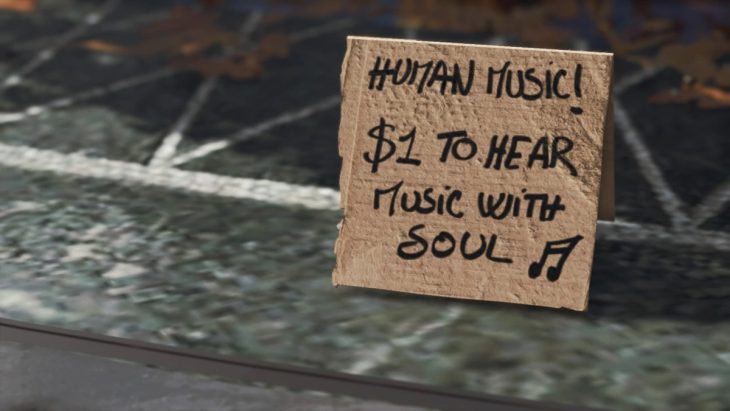 From the game Detroit Become Human – a fantastic exploration of AI what makes a person a person.
From the game Detroit Become Human – a fantastic exploration of AI what makes a person a person.
Television and film aren’t the only way we interact and lean on art.
I cannot tell you the number of times I have been struggling with, well, everything, and unable to find a way to express or clear it away. Then the right piece of music hits, and suddenly I’m a puddle on the floor, or my mind is hijacked and taken on a really impressive adventure. I lean on music a lot for coping with the world. It is even an incredibly important part of my writing process. I have crafted entire novels off a single song (the most recent example would be Skylark, which was written the moment I listened to a song, and then also with that one song on repeat for the three months it took to get that story out onto the page). I have listened to a song, and a critical scene plays out like a movie in my head, guided by the music. The most striking example is this song:
One day, if that story is ever published, I’ll let you all know which scene in particular this song engendered.
Books, of course, including audio books and comics, are other ways the arts create space for us. There are so many reasons and ways literature of all kinds can help. The simplest is a brief escape. I’m no longer me, sitting on the sofa, utterly destroyed by the state of the world. I’m a silent observer; part of adventuring party, or even the main character in another story. And in this story, however high the stakes may be, I am still safe on my sofa. It doesn’t matter what kind of escape. A low stakes, cozy read? Excellent escape. A dire, world-ending threat full of struggle and grief? Excellent escape (and also an opportunity to let those tears out at last). Escape is so important. It’s not forever. And it won’t solve the real-life problems for you.
 Image by Mystic Art Design from Pixabay
Image by Mystic Art Design from Pixabay
But rest is important. If you don’t have a rest day in your workout regime, your muscles will have not time heal, recover and grow. If you do not get adequate sleep, your cognitive function will be severely impacted. It’s no different for your mind/heart. If you don’t take a break from what is causing you distress, you’ll collapse beneath the weight of it all. It’s important to escape. Do it, and don’t feel guilty for it.
Literature also helps navigate terrible situations and scenarios for those of us who struggle with doing so in the real world. It helps give voice, using someone else’s words, to our experiences with enough separation that we remain safe. And sometimes, sometimes it can unlock the tings we need released in order to move forward. I have often been struggling with a completely separate grief, read a particularly tragic incident in a story that has nothing to do with whatever is weighing on me, and then cried. And cried. And cried. Not about the events in the book. But about the situation I’m facing. It’s just that the book helped unlocked the emotions that were trapped behind a dam I didn’t know I had built. Visual media has also helped with this; more with videogames than television shows or films of late, admittedly.
It’s no mistake that nearly all of us turn to the arts when things start going wrong. The arts are important and necessary.
So this is how you survive these interesting times. Consume art.
 Image by Jose Antonio Alba from Pixabay
Image by Jose Antonio Alba from Pixabay
And make it.
I know it’s incredibly difficult to create with the world literally on fire. Or if you’re sick in bed with all the energy of a sloth after a big meal. All the same, human beings are creators by nature. It doesn’t matter what art you create. Or if other people think that art is good. You don’t have to share it at all. It’s just for you. Just create.
That can mean something as simple as buying yourself a colouring book and going to town with crayons or pencils. Hell, even a ball-point pen will work if you’re in a pinch. Got some time between tasks at work? Doodle. Write a short poem. A piece of flash fiction. It doesn’t have to practical. It doesn’t have to be monetized. It does not have to appeal to anyone else. It’s just for you, unless you want otherwise.
If you want, share your art. But that is not required.
It is hard right now. It’s alright if you’re struggling to create. Lord knows, I am. Finding motivation is tough in the current clime. Sometimes I think that’s by design. If you’re too busy trying to stay afloat, how can you imagine anything better for yourself, your neighbours, or the world? So, if anger, frustration and rage is all you have left, use that. Create from that.
Create out of spite.
Create. Make it a giant middle finger to the people who are trying to hold you down, make it hard, steal your joy, stop you from imagining.
Create art. Consume art. It is good for your soul, and the world could use more soul, I feel.
And if you have the means, consider tossing a coin to your Witcher (artist), for their skills have kept the monsters at bay for a little while longer. And in a world full of monsters, that is not nothing.
When S.M. Carrière isn’t brutally killing your favorite characters, she spends her time teaching martial arts, live streaming video games, and cuddling her cat. In other words, she spends her time teaching others to kill, streaming her digital kills, and a cuddling furry murderer. Her most recent titles include Daughters of Britain, Skylark and Human. Her serial The New Haven Incident is free and goes up every Friday on her blog.
“Vanishing Treasures: A Bestiary of Extraordinary and Endangered Creatures” by Katherine Rundell
Dive into Vanishing Treasures, by Katherine Rundell, exploring the delicate balance between cultural heritage and…
The post “Vanishing Treasures: A Bestiary of Extraordinary and Endangered Creatures” by Katherine Rundell appeared first on LitStack.
Teaser Tuesdays - The Queen's Blade

Our realm, splintered and broken, yearned to be united under a single ruler. The Witches may have won and put one of their own on the throne, but even they had suffered.
(page 1, The Queen's Blade by Evelyn Ward)
---------
Teaser Tuesdays is a weekly bookish meme, previously hosted by MizB of Should Be Reading. Anyone can play along! Just do the following: - Grab your current read - Open to a random page - Share two (2) “teaser” sentences from somewhere on that page BE CAREFUL NOT TO INCLUDE SPOILERS! (make sure that what you share doesn’t give too much away! You don’t want to ruin the book for others!) - Share the title & author, too, so that other TT participants can add the book to their TBR Lists if they like your teasers!
THE FURY OF THE GODS by John Gwynne (The Bloodsworn #3)
Spotlight on “The Alchemist of Aleppo” by Marie K. Savage
The Alchemist of Aleppo bends the space-time continuum and embodies our fascination with what science…
The post Spotlight on “The Alchemist of Aleppo” by Marie K. Savage appeared first on LitStack.
Ten Things I Think I Think: January 2025
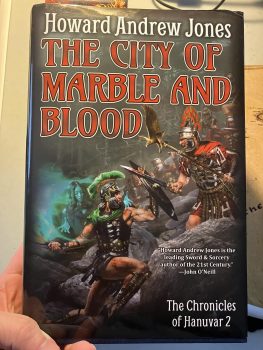 It’s been a whole month since I randomly shared my opinions on things I think How in the world have you made it through the start of this new year, without that????
It’s been a whole month since I randomly shared my opinions on things I think How in the world have you made it through the start of this new year, without that????
So, I think that:
1) THE CITY OF MARBLE AND BLOOD IS TERRIFIC
If you follow me on Facebook – or even read my column here every Monday, you know I’ve been talking about my Black Gate buddy Howard Andrew Jones, who passed away earlier this month. Click on over to see what I had to say last week about a really great guy.
I had not yet read Howard’s most recent trilogy, the Chronicles of Hanuvar. Howard’s Arabian fantasy mystery short stories featuring Dabir and Asim have been my favorites of his work (even more so than the two novels featuring the duo).
But man – this first book in the trilogy is his best work. Incorporating several short stories previously published, it’s very episodic in nature, which I liked. They’re linked together, making up Hanuvar’s ongoing quest, and the format keeps things moving. There’s no padding here.
While I have Robert E. Howard and Fritz Lieber on my shelves, I’m more an epic fantasy fan, ala JRR Tolkien, Terry Brooks, David Eddings, and Robert Jordan. I feel like Howard’s trilogy is epic sword and sorcery – a hybrid of the two which would also include Glen Cook’s The Black Company. It contains the individual adventuring aspect of sword and sorcery (stakes are more focused on the hero, not nations or empires), with the epic story scope of high fantasy. Howard’s trilogy is Epic Sword and Sorcery.
I finished Lord of a Shattered Land, put it on the Shelf, and immediately sat down and began The City of Marble and Blood. And boy, does something big happen by page twenty-five!! The latter two books are in traditional novel form. So be it – I’m in.
2) D&D NOVELS ARE STILL ENJOYABLEI used to own a bunch of the old D&D novels. Series’ such as Ravenloft, The Cleric Quintet, Dragon Lance, Forgotten Realms; dozens of them. I unloaded them during one of my periodic sell-offs over the years (I still have over 2,000 print books, but I’d love to have a lot of the ones which are gone. I still have the Gord the Rogue books, though!
I’ve written about The Temple of Elemental Evil and The Village of Hommlet more than once here at Black Gate. And right now, I’m listening to the audiobook of the ToEE. And it’s not bad.
If you’re looking for a quite D&D-like series, check out the Dhampir books by Rob and C.J. Hendee. They read a lot like a Dungeons and Dragons adventure.
3) JOHN MADDOX’ SPQR MYSTERIES ARE MY FAVESI have now listened to the first ten (of thirteen) of these mystery novels set in Ancient Rome, and I’ve talked about them in What I’ve Been Listening To. I have enjoyed every single of one of these, and John Lee is a PERFECT match as narrator. I can’t imagine anyone else voicing Decius Caecilius Matellus the Younger. I talked about it a little bit, here.
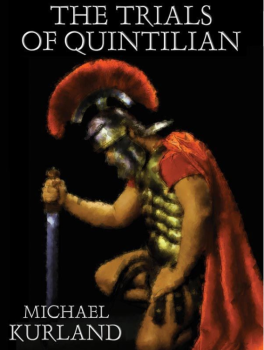 The cover itself is blurry – that wasn’t me!
4) YOU SHOULD CHECK OUT QUINTILIAN TOO
The cover itself is blurry – that wasn’t me!
4) YOU SHOULD CHECK OUT QUINTILIAN TOO
So, if you like SPQR, and you’re looking for more in that vein, check out Michael Kurland’s The Trials of Qunitilain. I’m a fan of Kurland’s Professor Moriarty novels. The Trials of Quintilian contain three stories that use the real-life Marcus Fabius Quintilianus as the hero.
He was an orator, rhetorician, barrister and educator. Here, he’s also essentially a private eye, gathering evidence for the client he is representing as a lawyer. I like the mix of PI and law, set in Ancient Rome. I picked up the ebook at a real steal, and it’s a fun, quick read. More old world Roman mystery stuff for me, please!
5) TOTAL WAR: WARHAMMER II KEEPS DRAWING ME BACKThere are a few games I reinstall every so often (sometimes a couple years apart), dive deep into, then move on. This – and WarHammer I, because combining them lets me play any faction from either game – is far and away my favorite RTS strategy game (it’s properly a hybrid, I think).
But man, I can sink hours upon hours into this. Often having to go back to a prior save and try a different path. While frustrating, it’s still kind of fun to try and make it work out. The first 10 – 15 turns for any faction are always hard for me, and I have a lot of false starts. I don’t actually fight the battles; I auto-resolve them. I like the city and troop building, and the strategies and faction relations. The fantasy aspect of WH makes this far and away my favorite.
They REALLY need to buy the Tolkien license and do TW: Middle Earth. THAT would be fantastic!! I cut my teeth on TW: Rome, and I suspect any Total War game in your interest area (Attila the Hun, Brittania, Egypt – whatever) would work for you. I’m not into Warhammer, but I do like this game.
6) NO WRITING PROJECT IS EVER BEYOND RESUMPTIONI haven’t been writing much lately, beyond my weekly column here (Note to self – quit playing TW: Warhammer II, then!!).
But last week I dusted off a project I started in 2011, and hadn’t worked on for quite a few years, I’m certain. But some real-life downs put me in a frame of mind where it was exactly what I needed to dive into. So, I’m almost done with the first draft of a Companion/Study Guide to Paul’s Letter to the Ephesians. It’s my favorite book of the Bible, and I plan on honing this guide to the sharpness of an obsidian blade.
I had to dig this off a recovered hard drive, it was so dusty. And though I abandoned it over a decade ago, it is thriving right now. No project – even no idea – is ‘dead’ unless you deem it so. And sometimes, an old one just might save you in more ways than one.
7) ANIMAL CONTROL AVOIDS BEING TOO DUMB FUNNYI only watched a couple episodes of Community, though I know about it. Star Joel McHale is the lead on Animal Control, which manages to stay on the side of being good dumb funny. It’s not clever dumb funny, like Galaxy Quest. But it’s not beyond stupid dumb funny, like Dumb and Dumber.
It’s not a thinking-heavy sitcom, but I like it pretty well. I am enjoying it more than Dennis Leary’s Going Dutch, which I haven’t given up on yet. However, Going Dutch doesn’t have much of any any depth to it, so we’ll see how long I can last.
8) I FAILED ON MY ANNUAL CHRISTMAS POST IDEAEvery Christmas (often Christmas Eve), I re-watch Humphrey Bogart’s ‘dark’ comedy, We’re No Angels. And every year, I observe that I really should write a Black Gate post on it. I’m 0 for every year on that. But hey – it’s a new year!!!
A terrific cast and light-hearted dark humor, it’s just about my favorite Christmas movie. Every time I see Peter Ustinov in this, I think that he would have made a good Dr. Watson back then. There was a modern remake (sort-of) with Robert DeNiro and Sean Penn. If that’s the only version you’ve seen, you really should go check out Bogie, Rathbone, and company.
9) I KINDA HAVE A NEW CHRISTMAS FAVE AS WELLThough it’s certainly not ‘new’ anymore, Jingle All the Way is about my favorite modern Christmas movie. It’s a silly (but not too dumb comedy with Ah-nuld Schwarzenegger, Sinbad, and a deliciously creepy Phil Hartman.
I think I’ve added Red One alongside Jingle, after watching it this year. When a Rock movie works, I really enjoy it, and this is like a Marvel-lite Rock Christmas movie. And that’s exactly what I want.
10) I LIKE ONE-OFF CHRISTMAS EPISODES FOR BRITISH TV SHOWSSome British mystery shows I watch, like The Cleaner, and Death in Paradise, air a new episode around Christmas day. I look forward to these now. I actually started a Death in Paradise re-watch after seeing the new Christmas episode (which featured ANOTHER cast change).
We’re talking 109 one-hour episodes, with multiple cast changes. We’re talking quite the investment. I’m almost through season five (of thirteen), and loving every episode. The ‘Christmas episode’ relit a fire. I wrote about the show some, here.
If you’ve seen episode one of season three (and you will absolutely know whether or not you have. A BIIIGGGG thing happened), I wrote an entire post on that one, earlier this month. Do NOT read it if you haven’t seen that episode. Trust me.
Prior Ten Things I Think I Think
Ten Things I Think I Think (December 2024)
Nine Things I Think I Think (October 2024)
Five More Things I Think: Marvel Edition (September 2024)
Ten Things I Think I Think: Marvel Edition ( September 2024)
Five Things I Think I Think (January 2024)
Seven Things I Think I Think (December 2023)
Talking Tolkien: TenThings I Think I Think (August 2023)
A (Black) Gat in the Hand: Ten Things I Think I think (August 2023)
5 More Things I Think (March 2023)
10 Things I Think I Think (March 2023)

Bob Byrne’s ‘A (Black) Gat in the Hand’ made its Black Gate debut in 2018 and has returned every summer since.
His ‘The Public Life of Sherlock Holmes’ column ran every Monday morning at Black Gate from March, 2014 through March, 2017. And he irregularly posts on Rex Stout’s gargantuan detective in ‘Nero Wolfe’s Brownstone.’ He is a member of the Praed Street Irregulars, founded www.SolarPons.com (the only website dedicated to the ‘Sherlock Holmes of Praed Street’).
He organized Black Gate’s award-nominated ‘Discovering Robert E. Howard’ series, as well as the award-winning ‘Hither Came Conan’ series. Which is now part of THE Definitive guide to Conan. He also organized 2023’s ‘Talking Tolkien.’
He has contributed stories to The MX Book of New Sherlock Holmes Stories — Parts III, IV, V, VI, XXI, and XXXIII.
He has written introductions for Steeger Books, and appeared in several magazines, including Black Mask, Sherlock Holmes Mystery Magazine, The Strand Magazine, and Sherlock Magazine.

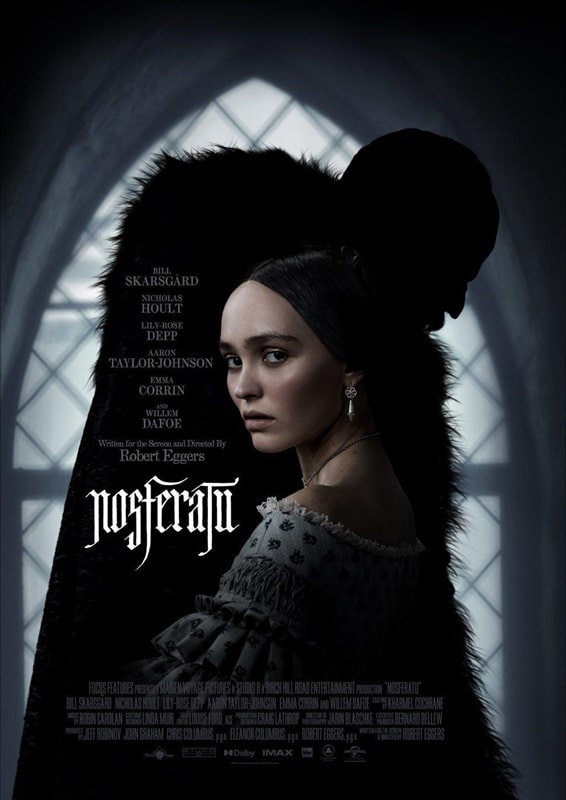




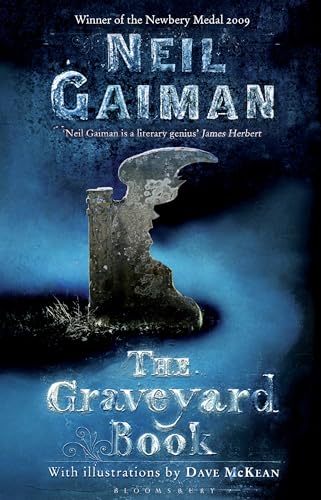
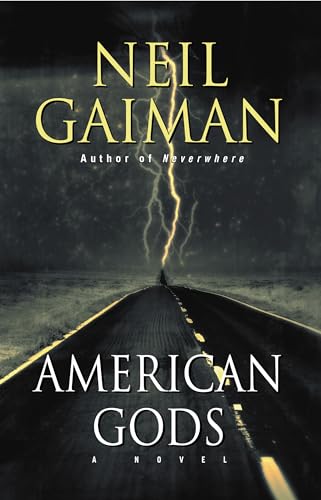
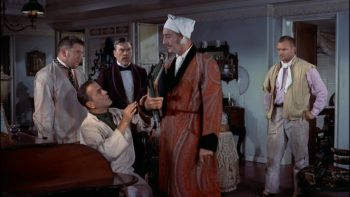
Recent comments